Rep. Sanfelippo: Killings are Wisconsin’s other epidemic

State Rep. Joe Sanfelippo, R-New Berlin, speaks at a statehouse hearing in this undated photo.
(The Center Square) – A suburban Milwaukee lawmaker says the coronavirus outbreak is getting plenty of attention, but the state’s other epidemic is being largely ignored.
Rep. Joe Sanfelippo, R-New Berlin, wrote an open letter this week explaining the troubles with Wisconsin’s “worsening crime epidemic.”
“In Milwaukee, homicides have increased at a truly alarming pace, with the city already having nearly surpassed its murder count for all of 2019 in a little over half a year, backsliding to a level not seen in decades,” Sanfelippo wrote. “Last week, five people were shot and killed in less than one day. In Madison, two more shooting deaths last week have similarly pushed the city well past its previous year’s murder count.”
As of July Fourth, Milwaukee Police say there were 86 homicides in the city. That’s nearly two times the homicide count at the same point in 2019.
The number of people who were shot but survived is also up dramatically since last year.
Sanfelippo said the jump in violent crime comes during a time when more and more people are signing-on to calls to “defund the police.”
“We have seen the problem of violent crime growing. At the same time, people throughout Wisconsin and the nation have demanded increased accountability from law enforcement,” Sanfelippo said.
Accountability is a good thing, Sanfelippo added, and something that Republicans at the Wisconsin Capitol would like to see as well.
“Earlier this year, my Republican colleagues and I introduced a set of proposals that provided a broad set of solutions to repairing our criminal justice system,” Sanfelippo wrote. “These included bills aimed at protecting domestic violence victims, strengthening our gun laws, increasing accountability and transparency into the actions of prosecutors and judges, making it harder for repeat offenders to slip through the cracks, and ensuring the safety of witnesses who come forward to testify.”
But Democrats in the state, including Gov. Tony Evers, opposed the measures.
“Unfortunately, our counterparts on the other side of the aisle largely opposed these common-sense measures, with Governor Tony Evers vetoing many of them. Moreover, many Democrats have even misguidedly called for defunding our police departments at a time when they are needed most,” Sanfelippo said.
Sanfelippo’s open letter came just a few days before Milwaukee Police Chief Alfonso Morales’ open letter in the Milwaukee Journal Sentinel making a similar case.
“We must have real discussions of what “defunding the police” means. If it means abandoning the concept of law enforcement, that is a nonstarter,” Morales wrote. “If that means conducting a laser-focused, deep dive into the responsibilities of policing and the consequences of reallocating resources, count me in.”
Morales went on to explain that defunding the police would not only hurt Milwaukee’s effort to fight the rise in homicides, defunding the police would hurt the very people that activists say they want to help.
“Being a Milwaukee Police Department officer in 2020 means being a part-time therapist, drug addiction counselor, landlord-tenant arbitrator, homelessness advocate, private security guard, traffic controller, parking attendant, family counselor and animal control officer,” Morales added.
“How would that defunding occur? And what does it mean to reinvest into ‘social services?’ Exactly which social services? Currently, the Milwaukee Police Department responds to more than 700 calls a day. Will that organization respond to a call at 2 a.m.? How about on a weekend?” Morales asked.
Milwaukee’s Common Council is considering a 10 percent cut to the Milwaukee Police Department budget. Morales said that would equal $30 million, and cost his department 375 officers.

